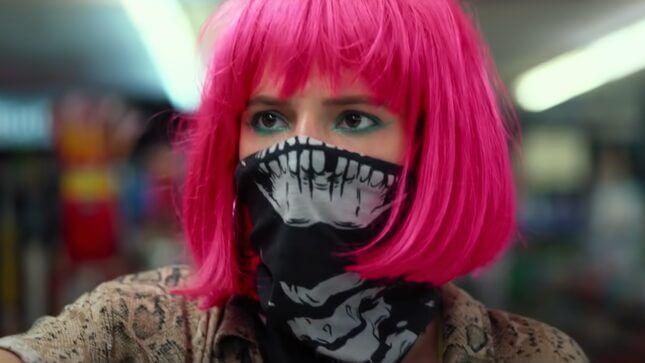

The premise of Bella Thorne’s latest film, Infamous, could’ve made for a good psychological thriller, even if it feels so familiar: Thorne is Arielle, a teenage waitress in a tiny Floridan town (or as she dubs it, “the Redneck Rivera”) who wants to be famous. She’s saving up to make it to Hollywood, but of course, things go awry and she finds herself spiraling into a life of crime. Arielle does eventually find fame, but it’s nontraditional: she live-streams every armed robbery she commits, updating a perpetually growing audience on her exploits.
If the movie invested in nuance, perhaps the Bonnie-and-Clyde-meets-Gen-Z-indictment could’ve been effective. Instead, it’s a clunky, implausible fairytale with dialogue that borders on parody. I wish it would’ve leaned into the humor inherent in that outrageousness because if you consider it a comedy, Infamous might just be absurd enough to warrant cult-status.
Spoilers ahead.
In the beginning, Arielle is bored. She works a thankless job and spends her nights partying with friends she doesn’t seem to like very much in outfits borrowed from Jessica Simpson’s character in The Dukes of Hazzard. Then she meets Dean (Jake Manley), a recently released ex-con living with his abusive, alcoholic father and working at his mechanic’s shop. When her money mysteriously goes missing—no doubt the result of her mom’s dirtbag boyfriend—Arielle runs off to Dean, who wouldn’t answer his phone because his father was attacking him. When she tries to pull the dad off, he starts hitting her, and Dean retaliates, pushing his dad down the stairs to his death. Naturally, the couple decides their only option is to run off to Los Angeles together, robbing gas stations and weed dispensaries along the way (the latter can’t bank or get loans, so they’re flushed with cash—if I learned anything from the 100-minute run time, it was that fact), slowing down only to say super realistic and cool young people things like, “Baby doll, let me taste those lips,” and “I ain’t no getaway driver. Baby needs a gun.” They cover their faces and film each transgression until they’re identified somewhere in Texas—not long after getting pulled over for speeding, which results in Arielle killing a cop. After one murder, all hell breaks loose and the movie unravels.
And I mean, it really unravels: in one scene, Arielle is shot—with a shotgun!—and manages to get away relatively unscathed. She’s also able to hold an automatic assault rifle and kill a few more cops during a high-speed highway getaway. I don’t know much about gunshot wounds, but I’m pretty sure that’s a medical impossibility, especially for a person who shot her first gun like one month prior. The impossibility of the scene reminded me of the long-forgotten 1998 action-comedy Blood, Guts, Bullets and Octane—another film that fancies itself irreverent like Quentin Tarantino but ultimately only really adopts the questionable nature of his films. But it’s also not funny. At least Infamous is funny in its preposterous plot.
And yet, somehow, Thorne killing cops on a wide-open Texas highway is not the most egregious scene in Infamous. That comes not long after when a self-proclaimed superfan named Elle (Amber Riley) picks Arielle and Dean up on the side of the road and agrees to house them for the night even though Arielle threatens her at gunpoint. Elle reveals that she recognized the criminals from their Instagram and still picked them up—she envies their lifestyle, their “message” of fighting against the system—all because she went to art school, couldn’t get a job, ended up as a telemarketer and is worried about her profession moving overseas. Basically, she’s presented as a personality-less amalgamation of all the concerns that plague the modern, educated young person, and for some reason, Arielle and Dean symbolize freedom from the status quo for her and their millions of other followers, even though their fame is thin, temporary, and inevitably, their downfall. While her desperation for virality is complete, it also destroys her. She did it for the ’gram, and it ruined her life.
If the moral is that social media fame is hollow and young people would be wise to pursue more meaningful ambitions, it doesn’t quite land—especially if the alternative is middle-class mundanity without any financial stability. But if there is no moral, and Infamous is viewed as poking fun at a deep misunderstanding of youth, it’s great!
Infamous is a fun watch if you manage to divorce its message from its content—that young people are social media-obsessed and fame-hungry, that they inherited an economy that offers them little fulfillment, or that the combination of those two factors warps their sense of reality—and consider it to be a caricature of that instead. (For what it’s worth, Gen Z is unequivocally involved in social activism—influencers will influence, but they’re not merely fame-hungry.) I recommend watching Infamous and thinking about it as Bella Thorne fan fiction: over the top, absurd, and a welcomed distraction divorced from any materiality. I also recommend watching it drunk.